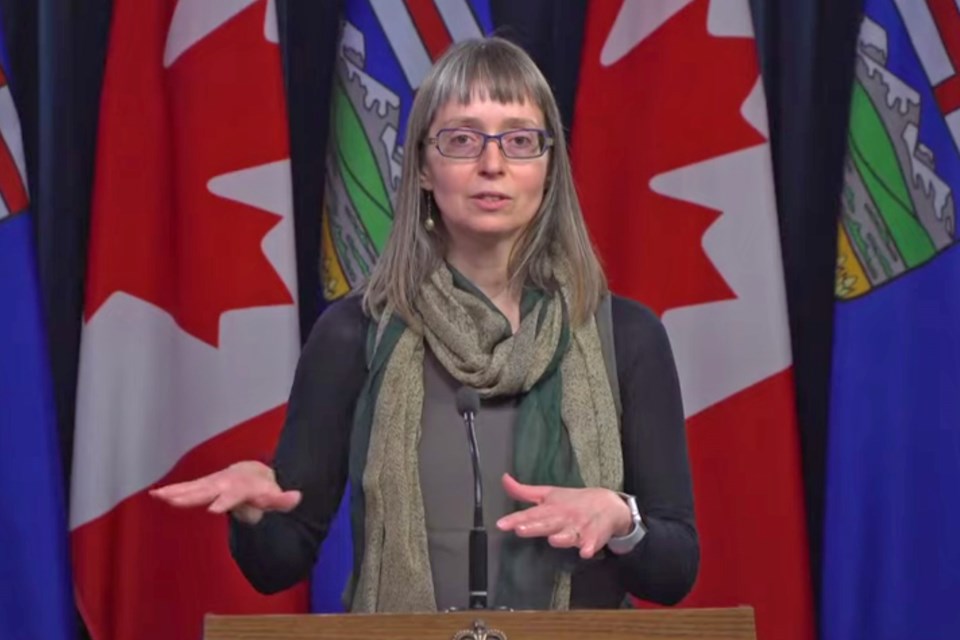ST. ALBERT – Alberta has confirmed 10 new cases of COVID-19, bringing the total number to 39 in the province.
Dr. Deena Hinshaw, chief medical officer of health, said six of the individuals are in Calgary zone and four are in the Edmonton zone.
Two of them, one in the Edmonton zone and the other in the Calgary zone, have been admitted into intensive care. Both people are in their 60s.
All others are self-isolating at home and expected to make a full recovery.
"We continue to take aggressive public health measures to limit the spread in Alberta," Hinshaw said. "However, I expect new cases will continue to be identified in the coming days."
Eight of the new cases are related to international travel or to a previously confirmed case, she said. Travel histories include a dental conference in Vancouver, Las Vegas, Switzerland, Germany, Spain and Pakistan.
Investigations are ongoing in the remaining two cases.
"I know many Albertans may be alarmed at the increasing number of cases in Alberta. As I've said before, we need to get used to a new normal. The reality is that we can expect cases of COVID-19 to continue in Alberta and Canada for months."
Beginning Saturday, the province will post flight information that includes the flight number, date and any seats on flights that may be at risk of exposure for COVID-19. Passengers in affected seats are asked to self-isolate for 14 days after arriving in Canada. Other passengers are not required to self-isolate.
On March 13, the province announced it does not recommend the closure of schools, daycares or post-secondary education to prevent the spread of COVID-19.
“Given the rise of the COVID-19 pandemic, we know parents, students and school officials are very concerned," Hinshaw said.
During Friday's announcement, she noted the World Health Organization does not recommend school closures as the only way to prevent the spread of COVID-19 in children.
However, if the situation warrants it, the Alberta government could direct the closure of an individual school, a group of schools, an entire school division, or all schools in the province.
"I want to assure all Albertans that their children’s safety is top of mind in all our decisions, and we are making the best public health decisions we can with the information we have, in this rapidly developing situation. We are prepared to make changes if and when the situation warrants it.”
To be effective, closures would need to go on for eight to 12 weeks, Hinshaw said. With the likelihood of new cases, school closures could last until September.
"I cannot emphasize enough, if we do make the decision to close schools, it will be considering a long term closure ... There won't be a clear opportunity to reopen schools, likely not until September at the earliest."
Hinshaw said she had a "productive" meeting with representatives from Alberta school board, school authorities and education stakeholders on how the province can adjust operations in response to COVID-19.
RELATED: Alberta puts protected COVID-19 leave in place for jobs
A new guide for schools and child care programs has been posted on the provincial government's website for more information.
Containment measures in the province are trying to "flatten the curve" by reducing the volume of spread over time, Hinshaw said, though actions will not be able to "completely stop it."
Practising good hygiene and employing preventative measures like social distancing can help prevent spread. Travel outside Canada is not recommended at this time, and anyone returning from outside of Canada should self-isolate for 14 days.
The most important action, though? Staying home when feeling sick, Hinshaw said.
"Even if you have not travelled, if you have symptoms of cough or mild cold-like symptoms, you need to stay home and away from others. This is critically important," she said.
"Although most of those cases would not be COVID-19, we want to make sure we're all practising the new normal, which is not to be out in public when sick."
The HealthLink 811 hotline is still experiencing wait times, though the online self-assessment tool launched Friday has seen noticeable traction, Hinshaw said.
In the span of 14 hours, more than 300,000 Albertans completed self-assessments online.
As of March 14, approximately 6,820 tests have been done for COVID-19 in the province.
People who are feeling well do not need to be tested, Hinshaw clarified.



